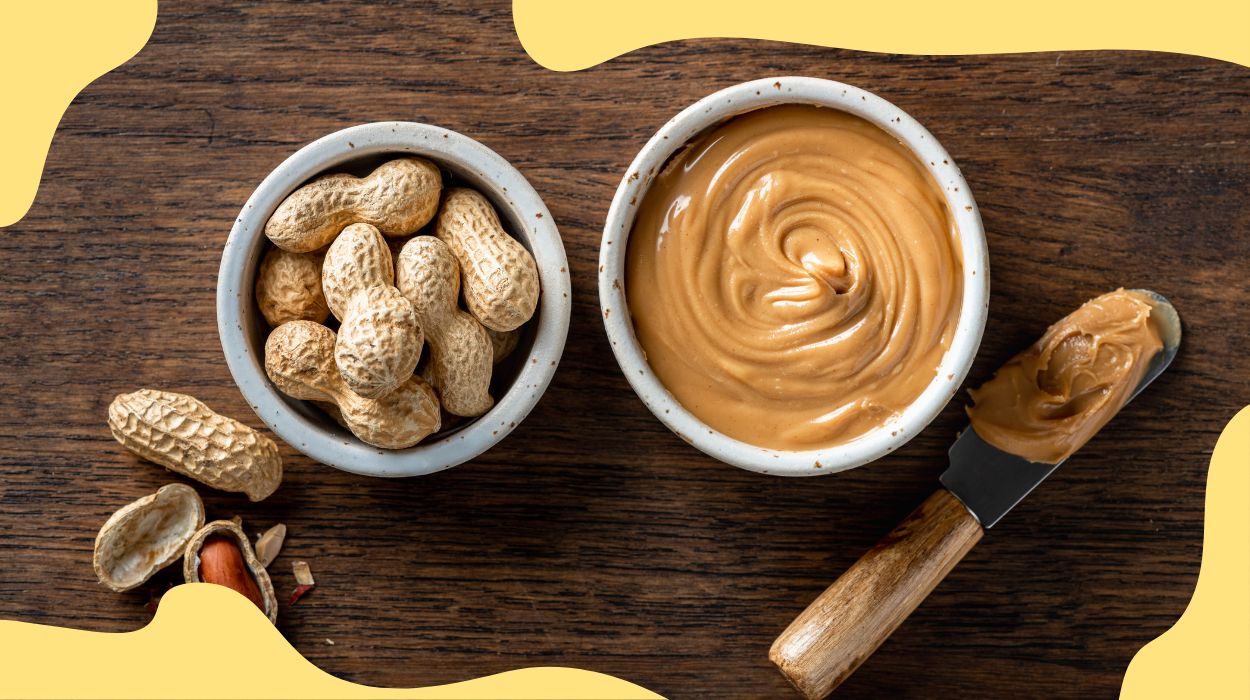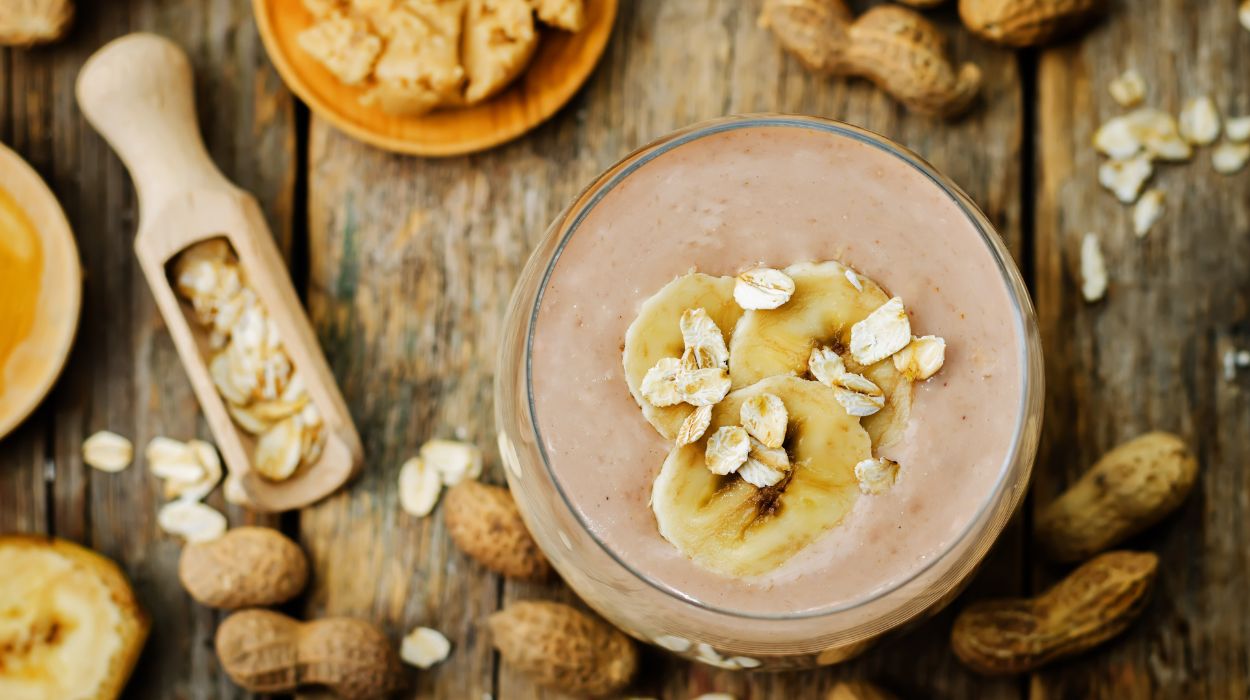 Expert's opinion
Expert's opinion
Expert's opinion
The article is a subjective view on this topic written by writers specializing in medical writing.
It may reflect on a personal journey surrounding struggles with an illness or medical condition, involve product comparisons, diet considerations, or other health-related opinions.
Although the view is entirely that of the writer, it is based on academic experiences and scientific research they have conducted; it is fact-checked by a team of degreed medical experts, and validated by sources attached to the article.
The numbers in parenthesis (1,2,3) will take you to clickable links to related scientific papers.
Is Peanut Butter Low-FODMAP? Let’s Find Out From Experts In 2024

You’ve probably heard of the low FODMAP diet if you struggle with gastrointestinal issues. The term FODMAP is an acronym for fermentable oligosaccharides, disaccharides, monosaccharides, and polyols. This dietary approach has recently become an effective alternative[1] for managing irritable bowel syndrome symptoms and digestive problems.
One question that frequently arises among people following a low FODMAP diet is whether peanut butter is low FODMAP. In this article, we will explore the low FODMAP diet, why peanut butter is considered low in FODMAPs, its nutritional benefits, and FODMAP-friendly types of peanut butter, and share some delicious FODMAP-friendly recipes featuring peanut butter. Let’s get started!
Is Peanut Butter Allowed On A Low-FODMAP Diet?
Yes, peanut butter is allowed on low-FODMAP diets in moderation. Choosing brands that don’t contain added sugars, artificial sweeteners, or harmful additives is important to ensure peanut butter is FODMAP-friendly.
Why Is Peanut Butter Low In FODMAPs?
Before delving into peanut butter, it’s important to understand the low FODMAP diet and why it can help alleviate digestive issues. FODMAPs are a group of carbohydrates poorly absorbed in the small intestine that can trigger gastrointestinal symptoms, such as bloating, gas, abdominal pain, constipation, and/or diarrhea in sensitive individuals.
The low FODMAP diet involves reducing or eliminating foods high in FODMAPs and then reintroducing them gradually to identify individual triggers. Examples of high FODMAP foods include fructans and galacto-oligosaccharides, which are found in foods like wheat, onions, garlic, and legumes. Disaccharides, such as lactose; monosaccharides, such as fructose and sweeteners; and finally, polyols, including sugar alcohols like sorbitol, mannitol, and xylitol.
So are peanuts low in FODMAPs? Is peanut butter okay for those following a healthy diet? Fortunately for peanut butter lovers, this delicious spread is low-FODMAP. Peanuts have a low oligosaccharide content. They also don’t contain any lactose unless lactose-containing ingredients are added during the manufacturing process.
Furthermore, peanuts are relatively low in fructose and polyols. Still, it is important to note that some commercial peanut butter brands may include added sweeteners or fructose-containing ingredients, so it is crucial to check the label and choose peanut butter without these additives.
Peanut Butter’s Nutritional Benefits
Peanut butter is not only low in FODMAPs, but it also offers a range of nutritional benefits. A 3.5-ounce (100-gram) serving of peanut butter contains:[2]
- 632 calories.
- 22 grams of carbohydrates, 6.3 of which are fiber.
- 24 grams of protein.
- 49.4 grams of fat.
- 0.38 mg of vitamin B6.
- 5.41 mg of vitamin E.
- 0.54 mg of copper.
- 193 mg of magnesium.
- 3 mg of zinc.
Although peanut butter is relatively high in calories, nuts, including peanuts, are loaded with healthy fats, fiber, and antioxidants. Here are five potential benefits of incorporating low-FODMAP peanut butter into your diet:
- Healthy fats: Peanut butter is rich in monounsaturated fats, which are considered heart-healthy fats. Research[3] suggests that these types of fats can help lower bad cholesterol levels and reduce the risk of heart disease. The monounsaturated fats in peanut butter can contribute to achieving or maintaining a healthy lipid profile and overall cardiovascular health.[4]
- Excellent source of protein: Like most nut butters, peanut butter is a great plant-based source of protein, with two tablespoons containing about 8 grams of protein.[2] Protein is essential for building and repairing tissues, maintaining muscle mass, and supporting immune function.
- Rich in fiber: Peanut butter contains a decent amount of dietary fiber, which is important for digestive health. Eating a fiber-rich diet can help promote regular bowel movements, maintain a healthy weight by promoting satiety, and support[5] gut health by feeding beneficial gut bacteria.
- Source of essential micronutrients: Natural peanut butters are a good source of a few essential vitamins and minerals, including vitamin E, magnesium, copper, and manganese.
- Energy boost: Peanut butter is a favorite among athletes thanks to its combination of healthy fats, protein, and carbohydrates. The blend of macronutrients provides a steady energy release, making it a great addition to pre-workout snacks or as a 4:00 pm pick-me-up.
Which Peanut Butter Is FODMAP-friendly?
When it comes to choosing peanut butters that are FODMAP-friendly, consider making it yourself to avoid unnecessary additives, or look for brands that are:
- Natural: Opt for peanut butters that only list peanuts and perhaps a bit of salt in the ingredient list. Avoid varieties that contain added sugars or artificial sweeteners, as these can introduce high FODMAP ingredients.
- Free of hydrogenated oils: Check the ingredient list for hydrogenated oils, which may contain the dreaded trans fats. While trans fats are not technically high FODMAP, they contribute to digestive issues for some people.
- Free of additives: Look for peanut butters with minimal additives. Several commercially processed peanut butters include added sugar, high-fructose corn syrup, stabilizers, emulsifiers, and preservatives, which can cause digestive discomfort in some individuals. Choosing peanut butter with fewer additives can minimize potential triggers.
FODMAP-Friendly Recipes With Peanut Butter
The best thing about peanut butter is that it is incredibly easy to incorporate it into all kinds of FODMAP-friendly meal plans. Here are three easy low-FODMAP recipes for indulging in the goodness of peanut butter:
Peanut Butter Fodmap Banana Smoothie

Ingredients
- 1 banana
- 2 tablespoons of natural peanut butter
- 1 cup of lactose-free or plant-based milk
- 1 tablespoon of chia seeds (optional)
- 1 tablespoon of plant-based protein powder (optional)
Instructions
- Blend all ingredients until smooth and creamy
- If desired, add a few ice cubes and blend again until it reaches your preferred consistency
- Pour into a glass and enjoy!
Thai Peanut Noodle Salad

Ingredients
- 8 ounces gluten-free rice noodles
- 1 medium carrot
- ½ red bell pepper chopped
- 2 green onions, chopped (green parts only, the white parts are high-FODMAP)
- ¼ cup cilantro, chopped
- 2 tablespoons natural peanut butter
- 2 tablespoons low-sodium soy sauce or tamari
- 1 tablespoon rice vinegar
- 1 teaspoon grated fresh ginger
- Crushed peanuts for garnish (optional)
Instructions
- Cook the rice noodles according to the package instructions, drain, and rinse with cold water.
- Combine the cooked noodles, red bell pepper, carrot, green onions, and cilantro in a large bowl.
- In a separate bowl, whisk the peanut butter, soy sauce, rice vinegar, lime juice, and grated ginger until well combined.
- Pour the peanut sauce over the noodle mixture and toss until everything is evenly coated.
- Garnish with crushed peanuts, if desired.
Peanut Butter Energy Bites

Ingredients
- 1 cup gluten-free rolled oats
- ½ cup natural peanut butter
- ¼ low-FODMAP sweetener of choice
- ¼ cup dark chocolate chips (optional)
- ¼ cup unsweetened shredded coconut (optional)
Instructions
- Combine the oats, peanut butter, sweetener, chocolate chips, and shredded coconut in a mixing bowl.
- Stir well until all ingredients are evenly combined.
- Form the mixture into bite-sized balls with clean hands and place them on a parchment-lined baking sheet.
- Refrigerate for at least 30 minutes to allow the bites to firm up.
Note: People following a low-FODMAP diet should limit to five bites per day.
Final Thoughts
If you are following a low FODMAP diet to heal your gut health, choosing foods that are gentle on the digestive system is important. Natural peanut butter made solely from peanuts without added high FODMAP ingredients is perfectly safe to eat in moderation for those following a low FODMAP diet. It offers a delicious taste and several important nutrients, like protein, healthy fats, and essential vitamins and minerals.
Remember to check the ingredient list when purchasing peanut butter, or better yet, make it yourself by blending dry roasted peanuts, the FODMAP-friendly sweetener of your choice, and a pinch of salt until smooth and creamy. If you can’t make it at home, opt for natural varieties free of added sugars and additives.
+ 5 sources
Health Canal avoids using tertiary references. We have strict sourcing guidelines and rely on peer-reviewed studies, academic researches from medical associations and institutions. To ensure the accuracy of articles in Health Canal, you can read more about the editorial process here
- Harvard Health. (2014). Try a FODMAPs diet to manage irritable bowel syndrome – Harvard Health. [online] Available at: https://www.health.harvard.edu/diseases-and-conditions/a-new-diet-to-manage-irritable-bowel-syndrome.
- Usda.gov. (2023). FoodData Central. [online] Available at: https://fdc.nal.usda.gov/fdc-app.html#/food-details/2262072/nutrients.
- David J.A. Jenkins, Chiavaroli, L., Wong, J.M.W., Cyril W.C. Kendall, Lewis, G.F., Vidgen, E., Connelly, P.W., Leiter, L.A., Josse, R.G. and Lamarche, B. (2010). Adding monounsaturated fatty acids to a dietary portfolio of cholesterol-lowering foods in hypercholesterolemia. [online] 182(18), pp.1961–1967. doi:https://doi.org/10.1503/cmaj.092128.
- Parilli-Moser, I., Inés Domínguez-López, Vallverdú-Queralt, A., Hurtado-Barroso, S. and Lamuela-Raventós, R.M. (2023). Urinary Phenolic Metabolites Associated with Peanut Consumption May Have a Beneficial Impact on Vascular Health Biomarkers. [online] 12(3), pp.698–698. doi:https://doi.org/10.3390/antiox12030698.
- Cronin, P., Joyce, S.A., O’Toole, P.W. and O’Connor, E. (2021). Dietary Fibre Modulates the Gut Microbiota. [online] 13(5), pp.1655–1655. doi:https://doi.org/10.3390/nu13051655.



